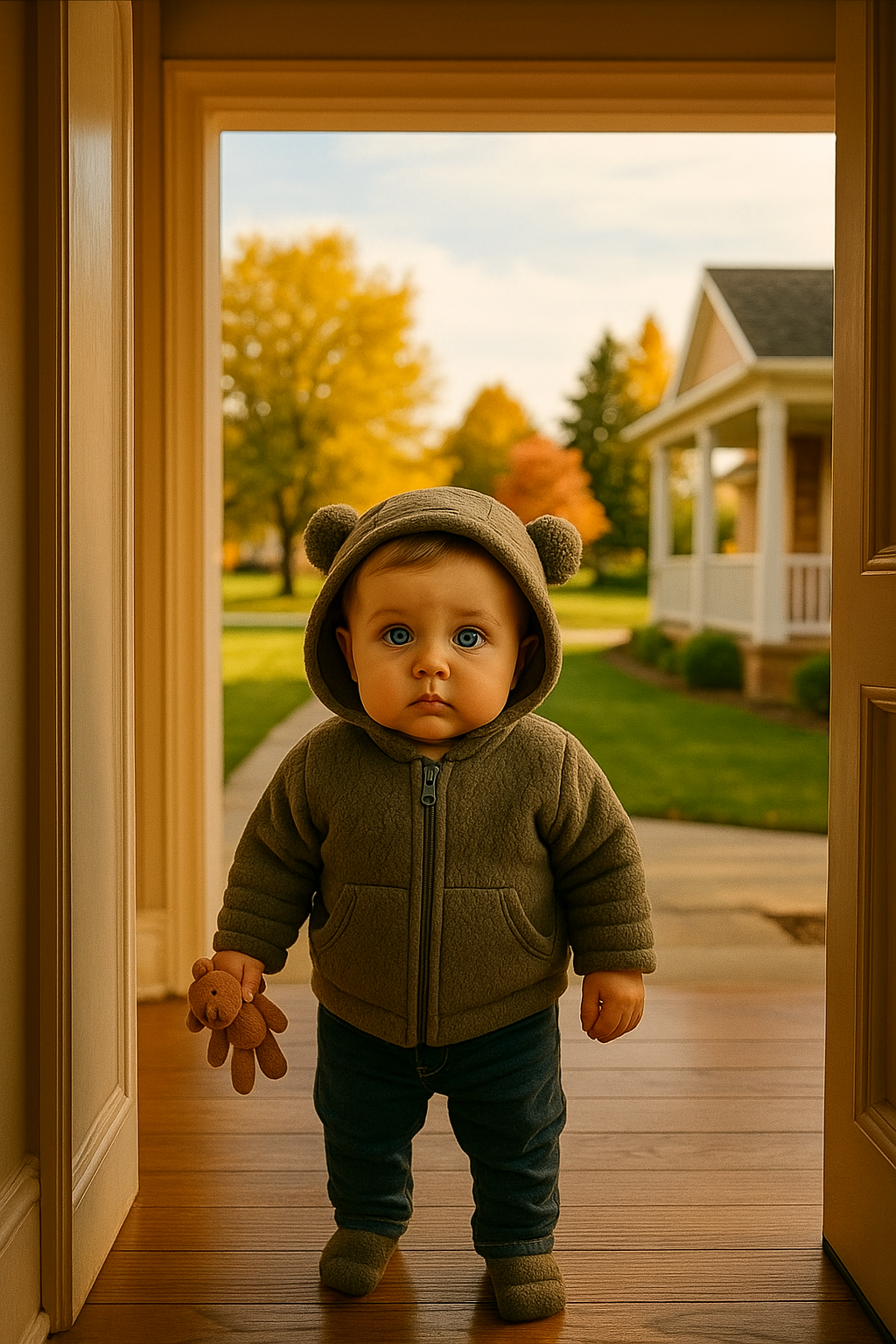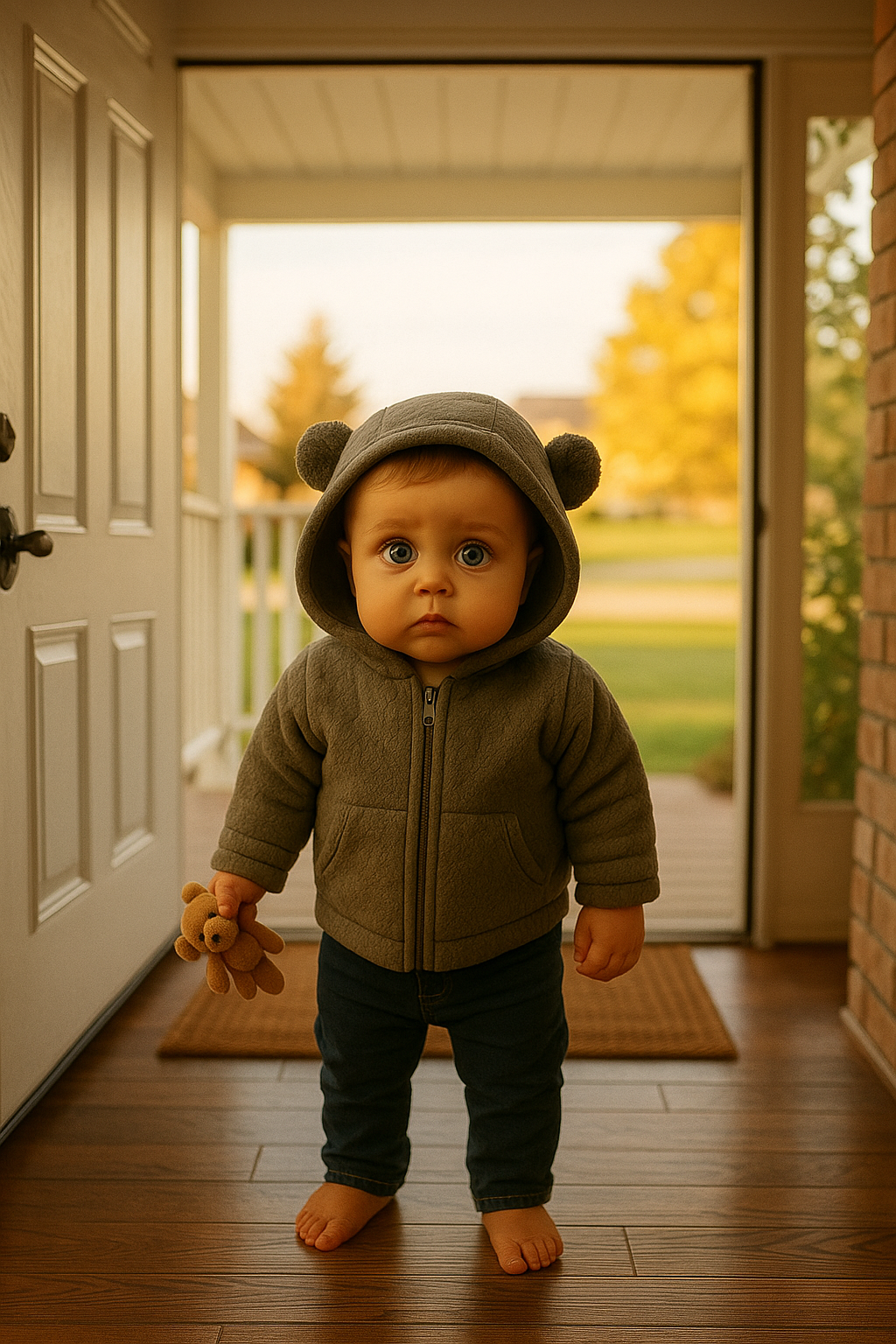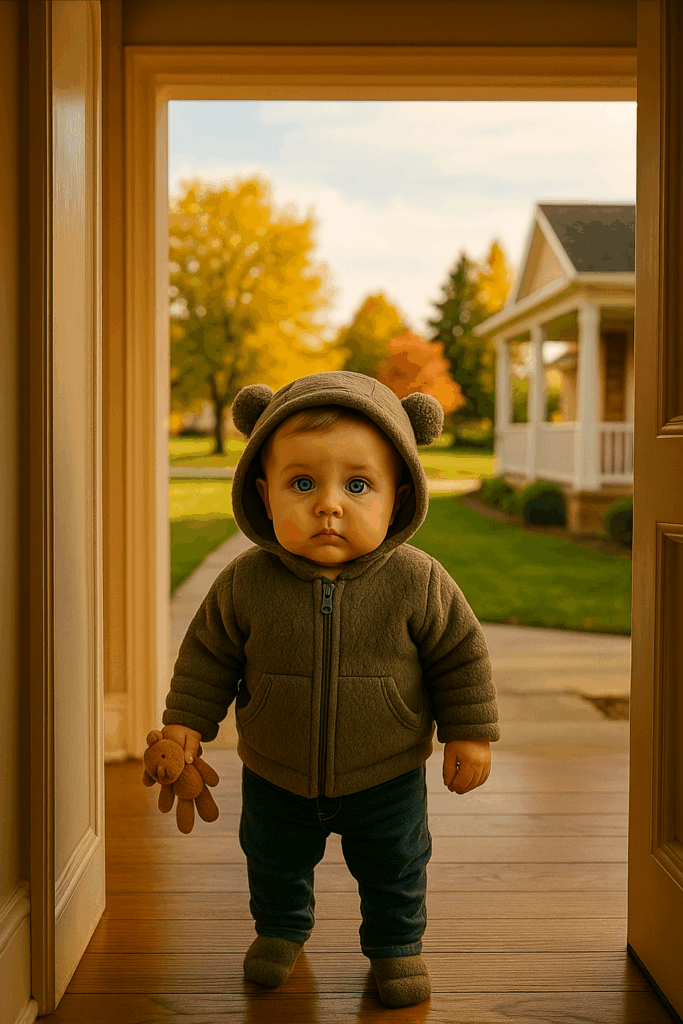The morning light usually brought with it the gentle sounds of my sleepy cul-de-sac. Birds chirping, distant lawnmowers. But for days, my tranquility was replaced by a growing unease. Every day, precisely at 9:00 AM, she appeared. A little girl, perhaps seven or eight years old, with bright, curious eyes, dressed in an immaculate, if slightly old-fashioned, dress. A small, vintage instant camera, its strap slung around her neck, was her constant companion.
She would walk up my short driveway, stop about ten feet from my front door, and raise her camera. Click. She’d take a picture of my door. Then another. And sometimes, a third, her gaze utterly fixed on the wooden panel and the brass knocker. She wouldn’t smile, wouldn’t wave. Just photograph, with an almost ritualistic precision. After a few minutes, she’d lower her camera, turn, and vanish around the side of my house, disappearing as silently as she had arrived. No car. No adult. Just her, her camera, and the unsettling repetition.
My name is Noah. I’m a graphic designer who works from my home studio, so I’m often present, but my door is typically closed, and I rarely catch her in person. I only saw her through the motion-activated security camera feed, a growing knot of apprehension tightening in my chest. Why was this little girl, so self-contained, so solitary, performing this strange daily ritual? Where were her parents? The thought that she was in danger, or that something more sinister was at play, began to consume me.
The fifth day, a Friday, I watched her again. Same time. Same solemn gaze. Same precise clicks of the camera. My concern had now escalated to alarm. This was beyond odd. This was a cry for help, a mystery I had to solve.

That evening, unable to shake the image of her determined face, I compiled a week’s worth of security footage. My hands felt clammy as I walked to the local police precinct. Detective Ramirez, a sharp-eyed woman with an air of quiet efficiency, listened intently, her expression serious as she reviewed the clips.
“She’s quite methodical,” Detective Ramirez noted, pausing the footage on a clear shot of the girl’s focused face. “Do you know her name?”
“No. I’ve never seen her before in this area, let alone this close,” I replied, my voice tense.
Detective Ramirez quickly ran the image through their facial recognition system. A match. “Her name is Isabella Sanchez. Her family lives about four blocks away. We’ll bring her mother in for questioning first thing tomorrow.”
The next morning, Detective Ramirez called. “Noah, can you come down to the station? Isabella’s mother, Maria Sanchez, is here. And… what we’ve uncovered is truly baffling.”
My heart pounded with a mix of anticipation and dread as I drove to the precinct. What fresh horror awaited?
When I entered the interview room, Maria Sanchez sat across from Detective Ramirez, her face haggard, her shoulders slumped in exhaustion. She was a young woman, perhaps in her early thirties, looking utterly worn down by life. Isabella’s vintage camera, its strap still dangling, sat on the table between them.
“Mrs. Sanchez, this is Noah,” Detective Ramirez began, introducing us. “Noah is the one who brought us the footage of Isabella.”
Maria looked at me, her eyes clouded with bewilderment and a deep, profound sorrow. “Isabella… she keeps going to your house? Taking pictures?”
“Yes. Every day, at 9 AM. She just photographs the door, then leaves,” I explained gently, my voice hushed.
Maria buried her face in her hands, a choked sob escaping her lips. “Oh, my God. I… I never knew. I thought she was just playing in the backyard. How could I have been so blind?”
And then, through her tears, Maria began to tell a story that twisted my stomach into knots, a tale of a mother’s desperate love and a child’s silent devotion.
Maria explained that Isabella’s father, Ricardo, had died six months ago in a tragic construction accident. Ricardo had been a talented photographer, a quiet man who found beauty in everyday things. He loved their small family fiercely. But he was also a man haunted by a devastating secret. Years ago, before he met Maria, Ricardo had been involved in a hit-and-run accident. He had fled the scene, panicked, and had been living with the crushing guilt ever since. The victim, a young woman, had survived but sustained life-altering injuries. Ricardo had secretly been sending anonymous payments to her family for years, wracked with guilt.
“But what does that have to do with my house?” I asked, confused, the new information painting an even darker picture.

Maria looked up, her eyes filled with a fresh wave of tears, a profound shame washing over her. “Ricardo… before he died, he was planning to confess. To the victim’s family. He told me he couldn’t live with the guilt anymore. He had found out where they lived. He even showed me a picture of their front door, just to show me he was serious. He said he was going to visit them, ring their doorbell, and finally tell them everything, seek their forgiveness. He said he was going to do it at 9 AM on a Monday morning, a new start. But… he died that Sunday.”
My blood ran cold. I remembered that, with a horrifying clarity. Seven months ago, my sister, Chloe, had been struck by a hit-and-run driver. She survived, but her life was changed forever, confined to a wheelchair. We had never found the driver. The police had closed the case. And her family, my parents, still lived in this very house. The house I now owned. The house Isabella was photographing.
The pieces clicked into place, forming a picture far more complex and tragic than I could have ever imagined.
Isabella wasn’t just photographing a random door. She was visiting her father’s unfinished confession. She was taking pictures of the place her father had intended to go to confess his darkest secret, to finally find peace. She was perhaps trying to complete his mission, to understand his desperate final intention, in the only way she knew how – by visually documenting the place that had held such immense significance to him.
“My God,” I whispered, the words catching in my throat. “My sister… Chloe… she was the victim. My parents lived here when it happened. She was struck down seven months ago, on a Sunday night. And Ricardo… he was the driver.”
Maria gasped, her face draining of all color, collapsing into the chair, tears flowing freely. The twist wasn’t just a lost child, but a child unknowingly entangled in a profound, intergenerational tragedy, carrying the weight of her father’s secret to the very door of his victim’s family.
Detective Ramirez, her face grim, looked from me to Maria, understanding the full, devastating irony. “Ricardo’s guilt… it led him to this house. And Isabella, in her grief, is unknowingly completing his final pilgrimage.”
A wave of profound, unsettling emotions washed over me: shock, anger, grief for Chloe, and a raw, aching pity for this small girl and her broken mother. This little girl, whose silent photographs had unnerved me, was simply a child trying to understand her father’s last, desperate act of penance.
The police determined that Isabella was not in danger, but caught in a complex web of grief and an inherited burden. Grief counseling for her was paramount. But I knew this required something more.
The next day, I waited. At 9 AM, Isabella appeared. Same dress, same camera, same focused gaze on my front door. This time, I opened the door.
Isabella froze, her camera lowered, her eyes wide with surprise, then apprehension.
I knelt down, slowly, gently, to her eye level. “Hi, Isabella,” I said, my voice soft, but my heart pounding. “My name is Noah. I think… I think your Daddy knew this house very well. And I think he was a good man who made a terrible mistake. And he was trying to make it right.”
Isabella’s lower lip trembled. “He… he was coming here to make things better?” she whispered, her voice barely audible.
My heart ached with the weight of both our families’ pain. “Yes, sweetie. He was. And now… maybe we can help him finish.” I gently placed my hand on her shoulder. “This house… it belongs to my family. And my sister… she was the one your Daddy hurt. Her name is Chloe.”
Isabella’s eyes filled with immediate, profound understanding. She didn’t cry out. She simply reached for her camera, lifted it, and for the first time, took a picture of me. Then she slowly, carefully, placed the camera back around her neck.
From that day, Isabella didn’t visit my porch alone to take photos. Maria brought her. And slowly, agonizingly, a bridge began to form. I introduced them to Chloe. The initial meeting was fraught with unimaginable pain and raw emotion, but also a fragile, emerging thread of understanding. Maria confessed everything, the story of Ricardo’s guilt, his final intentions. Chloe, initially consumed by anger, found a strange sense of peace in knowing the truth, in knowing her attacker had been tormented by remorse.
Over time, through shared tears and difficult conversations, something extraordinary began to heal. Isabella, no longer burdened by her father’s unspoken secret, started to play with Chloe, forming an unlikely bond. Maria and I, bound by a shared tragedy and a complicated legacy, began to talk, to build a future for our families, together.
My once-quiet porch, once the site of a painful secret, became a place of difficult conversations, of healing, of finding unexpected forgiveness.
The experience transformed me, my family, and the Sanchez family. We established a foundation in both Ricardo and Chloe’s names, advocating for victim support and restorative justice, proving that even from the ashes of tragedy, unexpected healing can bloom.
The story of Isabella and the silent photographs became a powerful, unsettling legend in our community about hidden burdens, about the long shadow of past mistakes, and about the profound, unexpected connections that can arise when you choose to confront truth, even when it’s utterly devastating.
And the question that lingers, echoing in the quiet understanding between two families forever intertwined, is this: How many unspoken secrets do we carry, and how many innocent hearts are unknowingly burdened by them, waiting for one act of courage, one unexpected confrontation, to finally bring them into the light and begin the long, arduous journey toward a truth that can finally set us all free?


